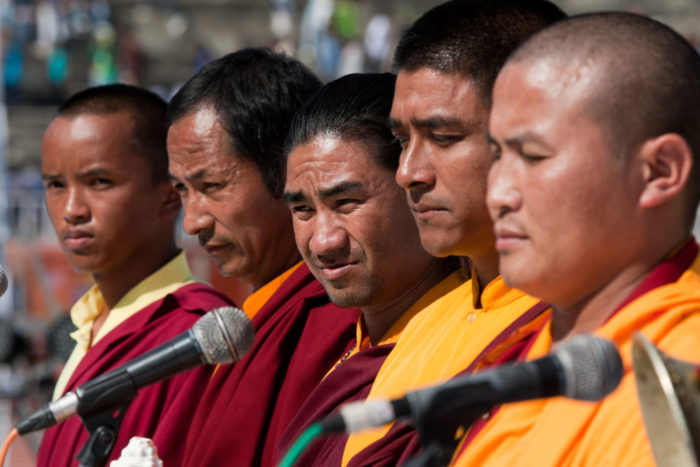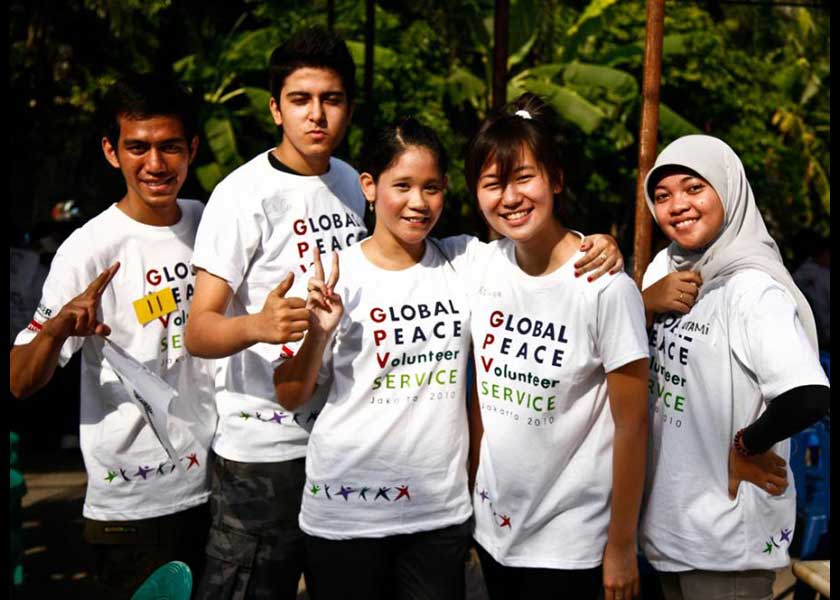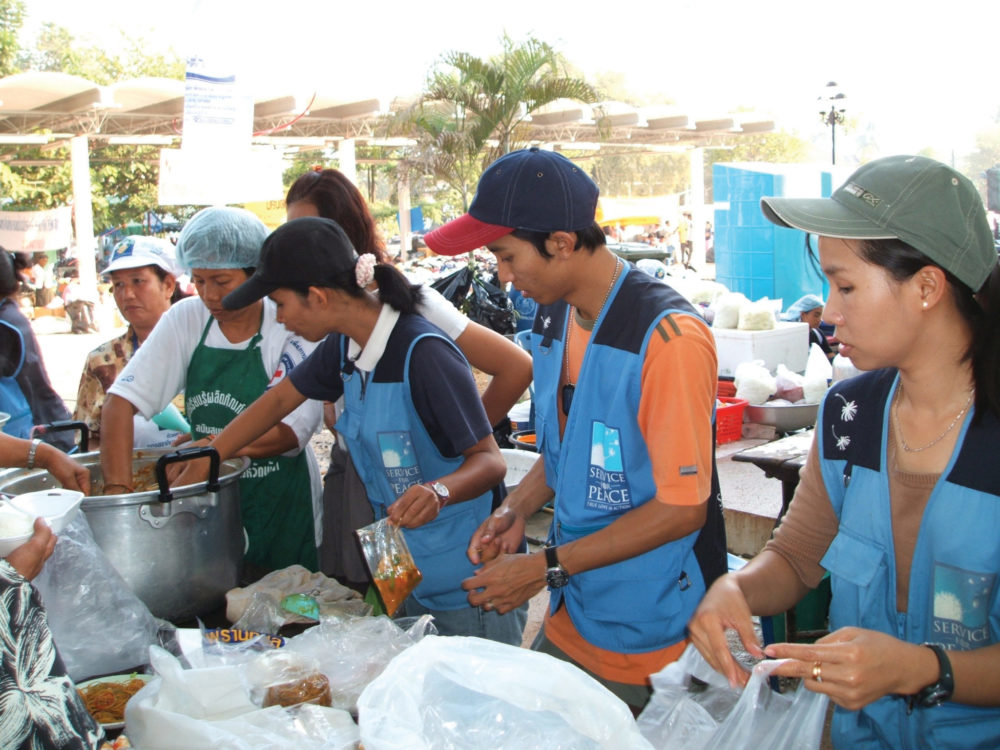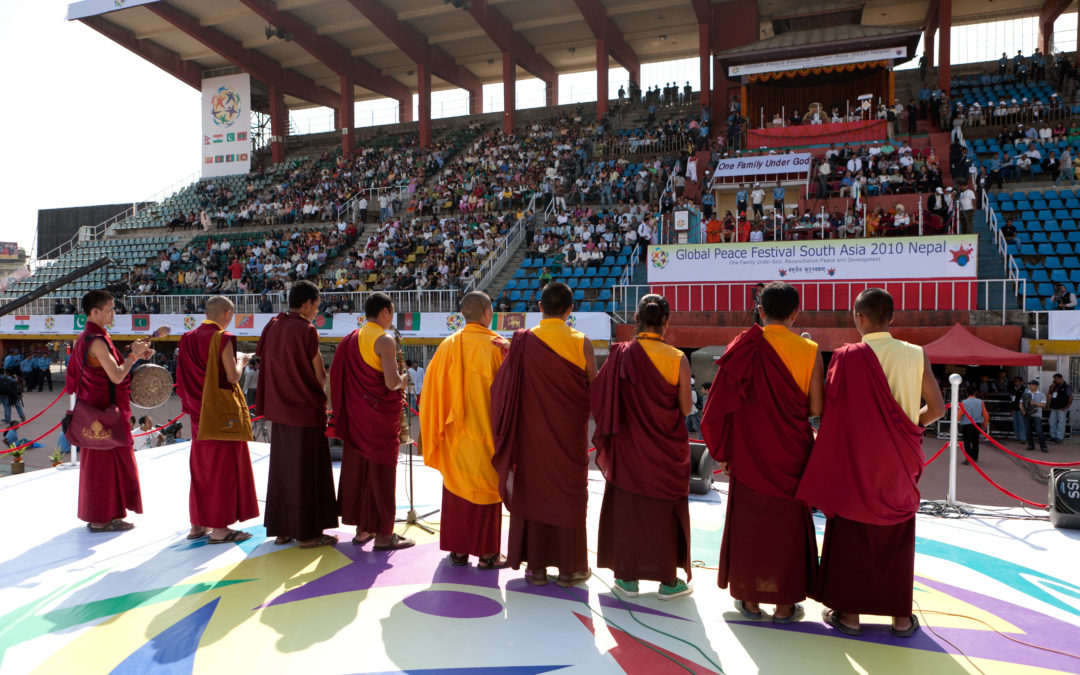Your excellencies, distinguished participants and guests, it is both an honor and pleasure to meet you at this Global Peace Leadership Conference, a key component of the Global Peace Festival South Asia 2010 here in beautiful Kathmandu, Nepal. Thank you for your participation in this important conference and for your continuing dedication to the cause of peace.
As most of you are aware, it takes tremendous dedication to make such a meaningful festival and conference a reality. It is only through “true owners,” who are willing to make the necessary sacrifices in their busy schedules, that the all too-important work for peace is sustained. Today, I especially want to recognize and appreciate Honorable Minister Rakam Chemjung, Hon. Daman Nath Dhungana, Mr. Kush Kumar Joshi and Mr. Bhashkar Raj Rajkarnikar, the president and vice president of the Federation of Nepalese Chambers of Commerce and Industry, and all other GPF South Asia Organizing Committee members, as well as all GPF partners and owners, for their tireless and sincere efforts. Let us give them an enthusiastic round of applause.
I would also like to express my sincere appreciation to the Honorable Prime Minister, H.E. Madhav Kumar Nepal, for addressing our conference this morning. Certainly he has many pressing issues to attend to, yet he is giving full support to this conference and festival and for this I can say that we are very grateful for his ongoing support. Finally, I want to appreciate our Mongolian delegate, representing the President of Mongolia, in giving that moving, stirring speech for the sake of peace. Let us give them both a rousing round of applause.
Ladies and gentlemen, this is a critical and historic moment for Nepal as it endeavors to complete a new constitution and birth a new nation. In April of this year, I had the distinct honor of addressing members of the Constituent Assembly to encourage them in that process. I suggested to them the importance of establishing founding principles and values rooted in a national vision that champion fundamental human rights for the freedom and prosperity of all Nepalese. Although the crafting of the new constitution has been postponed to a later date, let us show by applause our collective support and encouragement for great success in that ongoing essential effort!

Interfaith cooperation at the GPLC in Nepal.
As we survey the globe, we find that, like Nepal, many nations and regions are undergoing dramatic change, facing critical challenges but at the same time offering significant opportunities. Many are questioning established models of development, and are looking for alternative solutions, creating an opportune moment for leadership and change. We have entered an inflection point in human history where the circumstances of this moment are preparing the world for a paradigm shift of major proportions that could positively or negatively affect this century.
Being a man of faith, I cannot but feel the hand of divine providence guiding these developments in this era. Yet, at the same time, as a young man in my 40s, I feel the urgency for a new generation of global leaders to make their mark in history. I submit to you that the deciding factor at such times is always moral and innovative leadership, on every level.
What do I mean by “moral and innovative leadership”? First, it has to promote a “greater good” that can benefit not only the individual but the larger society, nation and eventually the world. This is the moral orientation of the leadership I am describing. In order to come to fruition it has to be guided by a vision or aspiration and a clear set of irrevocable universal principles and values that have the breadth and depth to encompass the diversity of the human family.
Secondly, it has to harness mankind’s natural creative need to advance and develop the human condition. This is the innovative component of leadership. As you all know, every culture has examples of its extraordinary men and women who propelled humanity forward in the fields of philosophy, ethics, the sciences, athletics and the cultural arts by freely exercising their God-given talents even to the point of challenging existing paradigms. Although many faced difficulties due to the religious, societal and legal constraints of their time, it is fair to say that the modern world with its greater freedoms and advancements has benefited greatly due to the sacrifices of these innovators.
Ladies and gentlemen, the modern era has seen some of the greatest scientific advances in recorded history that continue to shrink the globe with dramatic improvements in travel, communications, and the exchange of knowledge and information. Our once “global village” is fast becoming our “global home.” In the past, distance and time were the “physical impediments” that isolated and separated the human race. However, they are no longer relevant impediments. In other words, science and technology have taken away the physical barriers but have not taken away the social, racial, religious, national, tribal or ethnic pretensions which are still the sources of ongoing conflicts around the world.
The Global Peace Foundation is leading efforts for peace based upon a spiritual vision expressed in the simple yet profound phrase, One Family under God. This vision’s transformative power comes from the fundamental truth that all people, regardless of social class, race, religion, nationality, tribe or ethnicity, are spiritual beings who share a common heritage in one God or Creator. As Victor Hugo was to have said, “more powerful than an invading army is an idea whose time has come.” Around the world, our Global Peace Festivals have demonstrated that peoples of widely diverse backgrounds are ready to embrace this vision and commit themselves to engaging, working and living as one global family.
Centered upon the vision of “One Family under God,” GPF has developed multi-sector partnerships with its action-oriented initiatives in three key areas: 1) building interfaith partnerships, 2) strengthening families, and 3) promoting a “culture of heart” through service. In just three years, GPF has engaged more than a million people on six continents, drawing on the energy and conviction of civil society partners, the resources of the business community, the shared values of faith-based organizations, as well as the engagement of government agencies.
Our innovative approach to interfaith partnerships has brought leaders from all the great faith traditions, as well as those who do not have faith, to participate together in unprecedented ways. Unlike the interfaith efforts of the past which were often efforts by a particular religious tradition to promote tolerance or understanding from those outside of their faith, GPF conscientiously avoids advocating any particular religious tradition, but rather highlights spirituality as a basis of building a common platform of shared aspirations, principles and values. As a result, we are working effectively around the globe; from former communist bloc nations to the primarily pluralistic and capitalistic Americas; from the secular, progressive European Union to the deeply religious Middle East; from tribal Africa to the diversity and energy of Asia.

Group of Global Peace Volunteers in Indonesia
We have continually seen that when people of faith collaborate for the greater good, even the most challenging social problems can be effectively addressed. In Indonesia, for example, GPF is partnering with Nahdlatul Ulama (NU), the largest Muslim organization in the world, on a global interfaith summit. In preparation for this summit in Jakarta, we are already collaborating on joint programs such as the Power of Rupiah project that educates youth to be socially aware of the plight of their less fortunate neighbors, regardless of class, faith, and ethnicity as well as raising resources to address poverty and other serious social problems.
Secondly, GPF affirms that the family is not only vital to the well-being of the individual, but is also the foundation for global peace. The family is the school of love, where the virtues that underlie all positive social relations are learned. Therefore, it is vital to support the traditional institutions of marriage and family, both in public policy and through practical initiatives. I am proud to report that, through the efforts of GPF and its partners, the new Kenyan constitution which was recently adopted with overwhelming support included provisions to protect the sacred institution of marriage as well as the sanctity of life in the womb.
Both these issues are heavily contested in the more developed western democracies but Kenya, although considered to be part of the developing world, has taken a lead on these social issues, recognizing that they have national and global consequences. I would like to point out that this era offers such opportunities for other nations, rich or poor, to chart their own destinies and be leaders in key critical issues affecting the global community. But, of course to be leaders, one has to be guided by an altruistic spirit of service as well as being cognizant of the issues and their potential outcomes.
That is why GPF’s third area of focus is on creating a “culture of heart” through the cultivation of individual character and the transformative power of service. Service in this broader context entails tapping human creativity in collaborative efforts to solve problems, by making owners of the solution rather than merely participants in the process. Thus, GPF promotes social entrepreneurship and community driven development initiatives, “owned” by local partners, as important tools in addressing the most challenging human problems in the developing world, such as basic education, poverty and quality of life issues.

Service for Peace volunteers helping to package food.
Here in Nepal, a local branch of Service for Peace, an affiliate of GPF, offers primary educational tools through its library initiative and other projects. Over the last several years, they organized a program where student volunteers from the developed world come, under the Global Peace-Maker program, to renovate old existing libraries and to build new ones. In Sarlahi, a Mobile Library was established to bring literacy to the most remote of rural communities. In this village alone, 180 mothers and grandmothers have graduated from the Women’s Literacy Program. After their experience, most of the young international volunteers felt a deep brotherhood and sisterhood with those they served as well as a renewed commitment to global peace and co-prosperity through service. In addition, those Nepalese who received this literacy training, now feel that new vistas of opportunities which were closed in the past have now been opened to them and their families.
Given the successful track record of such programs to make a real and significant difference in the most rural communities of Nepal, GPF, through two of its subsidiaries, the Global Peace Service Alliance (GPSA) and the Global Peace Youth Corps (GPYC), is engaged in such community-based models that tap the strengths of local, social entrepreneurs. Recognizing the importance of self-reliance and a spirit of responsibility and ownership, it is promoting methods of balanced development that are socially, economically and environmentally sound. A good example is the “Global Peace Volunteer Project” here in Nepal, through which over 1500 students to date have joined, received training as peace volunteers, carried out a number of service projects and also have helped establish small businesses for poor people. More students are volunteering every day.
Another globally recognized initiative, which comes from GPF’s commitment to community-based, environmentally friendly development, is the Nairobi River cleanup project. Launched in 2008 with the Global Peace Festival in Kenya, it was christened as the Rivers of Peace initiative. At that important moment in the history of Kenya, when the nation was on the verge of civil unrest with it post-election violence, the Nairobi River project galvanized a nation by gathering thousands of volunteers from conflicting tribes, working together to clean up one of Kenya’s most important, yet most polluted, waterways. This model project has been recognized by the UN Environment Program as well as the Kenyan government which, to this day, continues to support this initiative. The reason I mention it here is that this model is being successfully applied here in Nepal for the Bagmati River, where similar conditions exist.
The reason GPF recognizes the importance of community-based initiatives comes from my own direct experience as a Korean who witnessed the amazing economic transformation of post-war Korea. After the Korean War in the early 1950s, a national program of community-centered development, called the “New Village Movement” planted the seeds for Korea’s tremendous economic growth and a sense of national identity. Today, little more than fifty years later, South Korea is considered a model of economic success and is now a member of the G-20 group of nations, hosting the next summit in November of this year. I believe that the practical elements of the “new village” model coupled with GPF’s commitment to build a “culture of heart” is an innovative combination that can provide an effective model for ongoing development projects here in Nepal and the rest of South Asia.
Ladies and gentlemen, Nepal is a nation with a long history and international reputation as a spiritually-oriented land. It is the birthplace of Buddha, the founder of a great religious tradition practiced by millions around the world. As high as the mountains that crown this land, it has been a place where the seekers of lofty goals such as peace, enlightenment and spiritual knowledge have made their pilgrimage. Yet, while we might say that Nepal is spiritually and naturally blessed, it still struggles with the real challenges of building a new nation as well as addressing the problems of all developing countries such as primary education, poverty and lack of socio-economic opportunities.
Fortunately, due to the current political circumstances in Nepal, its citizens are very engaged in civic debate about the future direction of their nation. The time is ripe to seek new, innovative solutions which can forge common cause and a renewed sense of national identity. The starting point must be a vision that encapsulates the national aspirations as well as the principles and values which can guide its development. I firmly believe that that vision is none other than “One Family Under God.”
If Nepal can emerge from this somewhat tumultuous transition on the path to a stable, free and prosperous nation, it can serve as model for many other nations facing similar challenges, especially here in south and central Asia. Its ability to do so depends in large part on the principles and values that guide its development as well as the aspirations which give it a sense of purpose and direction. In other words, it has to have a universal vision which can embrace Nepal’s varied constituent communities and common cause. The roots of this much-needed vision have already been long planted here in Nepal, expressed in the sacred texts of the Vedas as “Vasudhaiva Kutumbakam,” conveying the same essence and spirit that we can also express as “One Family Under God”.
As we gather here on the rooftop of the world, where the heavens and the earth converge, let us aspire to the highest heights and the noblest of endeavors for the sake of this nation of Nepal, South and Central Asia and for the world. Let us dare to dream the greatest dream of all. Let us build “One Family Under God!!!”
May God bless you and your families, thank you very much.

